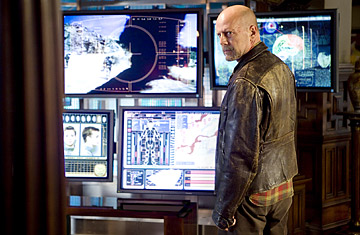
Bruce Willis in Surrogates
Is Bruce Willis the best leading man of his generation never to have been nominated for an Academy Award? Willis's name doesn't come up much at Oscar time, and it's not as if he shows any signs of caring about industry recognition. Maybe people in Hollywood think of him as just another tough guy, wise-ass and cocksure, and figure that star acting is something that lucky people are born with and get well paid for. But think of some signal films of the past decade or so: Pulp Fiction, M. Night Shyamalan's The Sixth Sense and Unbreakable, Robert Rodriguez's Sin City. The Die Hard series, for that matter. At the center, there's Willis, playing men wracked with more psychic pain than they could ever dish out.
He's also in a lot of junk, like this week's Surrogates, an ambitious but sub-ordinary SF epic in which, as so often, Willis is better than his material. He keeps you watching, inspecting the carcass, and not just because there's not much else to look at. With his coiled poise and the compact gestures of someone who doesn't mind being scrutinized by the camera, Willis exudes worldly wariness and cosmic weariness, as if he'd achieved a state of Zen machismo. He offered a giant dose of this in the last and best Die Hard movie, in 2007, where his hero, John McClane, was so close to a still life — his own heroic statue — that we wondered if the guy was even alive. Well, yes and no. There's an ache in the eyes of the typical Willis character that says he's been through hell and brought a part of it back with him.
At 54, Willis is the one star from the Bronzed Age of '80s action movies who still can persuasively embody a haunted, implacable stud. Chuck Norris went into TV, as a Texas Ranger and a cheerleader for Glenn Beck. Jean-Claude Van Damme is mostly reduced to made-for-video cheapies. Schwarzenegger's in the public sector. Jackie Chan still makes movies on both sides of the Pacific, but a lifetime of martial-arts exertions has rendered him creaky. Only Willis remains — the last action hero. (Clint Eastwood doesn't count; he came two decades before these guys and, besides, he's, like, immortal.)
Maybe Willis is so convincing playing working stiffs because he comes from that background. His father William was a career soldier and a welder, his mother, Marlene, a German girl William met while stationed abroad. Bruce grew up in South Jersey, skipped college to study acting and supported himself with real jobs: security guard, private investigator, tending bar in the Village and SoHo. (He also pursued a singing career as his alter-ego Bruno — an addiction he continued to indulge.) Willis has nothing of the adolescent in his persona, perhaps because he was in his 30s before anybody noticed him. Certainly he'd grown into the Bruce Willis character by the time he got the costarring role with Cybill Shepherd in Moonlighting. His character was the sun-caked earth to Shepherd's airy prom queen, and its success propelled him into a series of big-screen comedies for which the best remedy is amnesia. It took Die Hard in 1988, and a poster of Willis all muscled up and sweaty, to make him a plausible cop-hero action star.
He's a half or double hero in Surrogates, another cyborg epic from the writers and director of Terminator 3: Judgment Day, and based on a graphic novel. The movie imagines that, in day-to-day activity, lifelike robots have mostly replaced humans, who sit at home speaking for the droids and controlling their actions. It's a piquant premise for those of us who see Americans retreating to near-stasis in front of their computers, enjoying (or condemned to) a life no more than virtual. But the main story, in which humans and robots do battle for the future of the collective soul, is familiar from many a Philip K. Dick story, like Minority Report, not to mention The Matrix and, in its proposing of a renegade colony of humans, District 9. Unfortunately "like" doesn't mean "as good as." Surrogates is busy and brainy but dyspeptic — an action movie that aspires to entropy.
The only fun the film rouses itself to is casting Willis as both Greer, a grizzled, bearded depressive (his son has recently died in a car accident, the victim of lazy screenwriters), and his nearly unstoppable surrogate, who lives out the career as an FBI agent that Greer used to do himself. It's a hoot to see Willis looking young and blond, his face miraculously unlined. This is how he might actually appear today if he'd stayed in TV — and if he'd been a much less daring and dangerous actor. But the spectacle won't lure enough customers to make Surrogates a big-money winner.
A flop wouldn't be surprising. The box office numbers will tell you that Willis isn't in the star stratosphere. Since The Sixth Sense in 1999, Live Free or Die Hard is his only live-action vehicle to top $100 million domestic. In part that's because Willis makes the movies he wants to, alternating pop fare with offbeat comedies and art-house vehicles. He agreed to do The Sixth Sense only on the condition that Disney would bankroll a movie he really wanted to make, Alan Rudolph's version of Breakfast of Champions. One movie made $294 million, the other $178 thousand. You can guess which film Willis preferred.
The bottom-line junkies in Hollywood may look at the middling grosses of Willis's non-hits, and the man's hefty price tag, and conclude that they can do as well with somebody younger and cheaper. But none of today's kids can give an action role the experience, the ingrained grittiness, that he can. There's simply no surrogate for Bruce Willis. As a star and an actor, he's the real, irreplaceable thing.
